Innovative Educator Fellowship
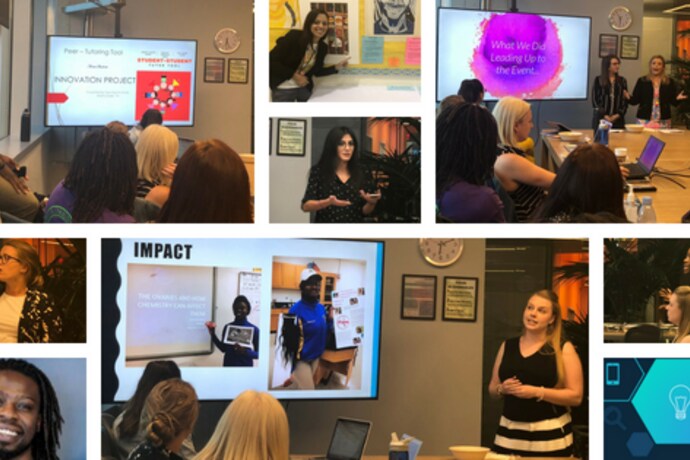
Innovation is often associated with industries such as biotechnology, healthcare, information technology and engineering. However, many people fail to realize education as a sector where leaders, both inside and outside of the classroom, are developing innovative ideas and implementing them to create better learning experiences and outcomes for students. At Teach For America and Achieve Miami, we know that innovation and excellence are critical levers in the work toward achieving an equitable educational landscape. This is why we constantly strive to create opportunities for our teachers to be innovative in their work. One such opportunity is the Innovative Educator Fellowship, a partnership between Teach For America Miami-Dade and Achieve Miami. The fellowship is a professional development experience for teachers who seek to raise the "bar of excellence" across Miami's educational landscape in entrepreneurial ways. The second year of the fellowship, which began in November 2017 and culminated in May 2018, guided and supported nine TFA Miami-Dade educators as they developed their innovative projects with goals of transforming their classrooms and schools for the better.
Participants in the program had the opportunity to visit innovative New York City and Miami schools such as, KIPP STAR Elementary, KIPP Infinity Middle, Fannie Lou Hamer Freedom High, Beacon College Prep, Ransom Everglades, and MAST Academy, to gain inspiration. Each Fellow received a $500 stipend as part of the fellowship to help bring their projects to fruition. Innovative Educator Fellowship participants included TFA Miami-Dade alumni and current corps members, Yaw Asante-Bio, Antonela Cesar Giordano, Jocelyn Figueroa, Alexa Guy, Katelyn Hunt, Alexandra Pierce, Jaclyn Schroder, Lianne Shemitz, Eric Steen and Jackie Zambrano. Get to know each educator and the impact their innovation project is having on Miami-Dade students below:
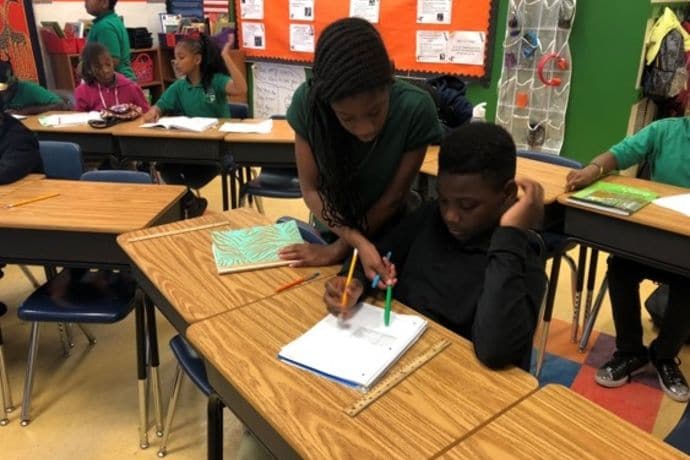
Yaw Asante-Bio (Miami-Dade ‘14) - Students Teaching Students
4th Grade Math Teacher, Beacon College Prep
Mr. Asante recognized an opportunity to use innovation to increase student engagement and help students master learning objectives and outcomes. He developed a peer-to-peer teaching resource that uses in-person activities and video recordings to empower students to own and teach new materials to each other. Students who have mastered a particular lesson support and guide students who have not. Since implementing the project, Mr. Asante says students are more invested, confident and eager to learn. Furthermore, he has seen an increase in academic performance, with students now taking more accountability and ownership of their work. Mr. Asante notes that his project also encourages, “students to do what it takes to help their classmates succeed.” Mr. Asante plans to launch the peer-to-peer video lessons on a shared platform in the near future, so that his project will be able to support other teachers and students throughout his school and across Miami.
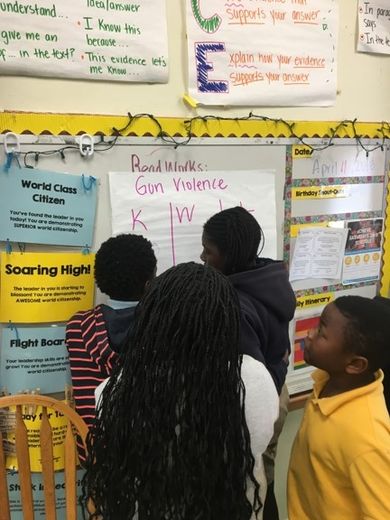
Antonela Cesar Giordana (Miami-Dade ‘15) - Citizens at Work
4th Grade Teacher, Earlington Heights Elementary
Ms. Giordana, has taught her 4th grade students since they were in the 2nd grade. After the 2016 presidential election, the students expressed that they wanted to do something to make a difference. This inspired Ms. Giordana to create an innovation project around ubuntu, a Nguni Bantu philosophy meaning, I am, because we are, and it is a part of our humanity to help others. She launched an innovation project to teach students how to develop a community service project. Together, they learned how to identify causes they care about, research them, plan a service project and share what they learned. Some of the issues chosen by students included, gun violence, bullying, pollution, unsafe social media, gangs, drugs. Students created a museum setting in their classroom and shared their research with each other in a classroom “gallery” walk. The students learned how young people can play a role in working toward solutions, and Ms. Giordano shared that she also learned a lot about her students. “Students opened up about the personal connections they have to some of the issues they chose. Knowing my students more will help me to better serve them.”
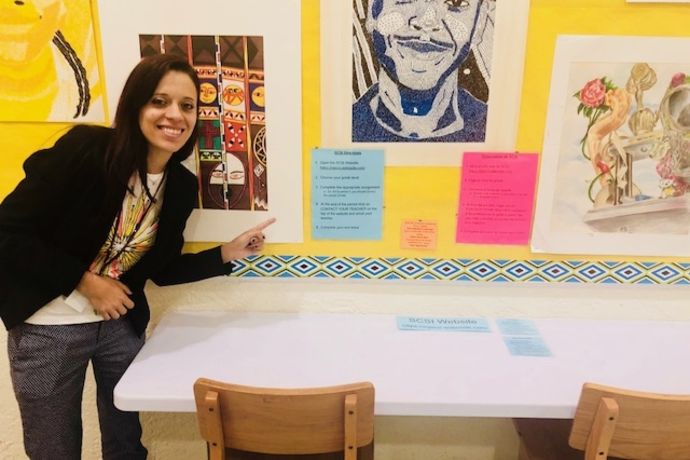
Jocelyn Figueroa (Miami-Dade ‘14) - Continuous Learning Outside of the Classroom - CSI Edition
Transformational Science Coach - Miami Jackson Sr. High School
Ms. Figueroa recognized that when placed in in-school suspension (CSI), learning came to a halt. As many as 20 to 30 students were put into CSI each day for various levels of infractions, where they lost instructional time and class credit. Students returned to their regular classes even further behind than their peers and discouraged by failing grades, causing many to repeat a vicious cycle that led them back to CSI for bad behavior. In partnership with school administrators, Ms. Figueroa was determined to make a change. For the project, Ms. Figueroa created three new systems in her school. The first was a way to keep students out of CSI by offering after-school tutoring as an alternative response to minor infractions. The second was a new virtual CSI school, where students receive web-based digital lessons by subject and grade level for class credit. The third strategy is a system that holds all teachers accountable for grading and accepting CSI assignments. With the support of the fellowship grant, Ms. Figueroa purchased classroom decor, school supplies and laptops. She will continue to track outcomes in hopes her project meets its goals of increasing student academic performance and agency over their grades, while also improving student morale and overall school culture.
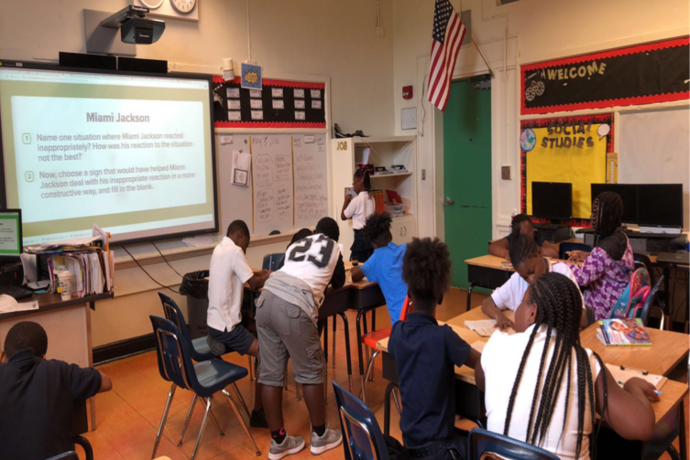
Alexa Guy (Miami-Dade ‘16) - Social and Emotional-Based Learning
3rd Grade Intensive Acceleration Teacher, Liberty City Elementary
Ms. Guy’s project stemmed from her belief that schools should consider the needs of the whole child. “It’s difficult to teach students without first trying to understand their emotional needs upon entering the classroom,” she explains. For her project, Ms. Guy wanted to address the correlation between school achievement and added emotional-based learning. First, she added a daily ‘emotional check’ for her students in which she would ask them to rate how they were feeling each morning. She found that most children were ‘not sure how they felt,’ so she developed ways for them to discuss their feelings by drawing parallels to the stories they were reading. Students learned how to respond to emotional situations by relating to the experiences of characters in their books and offering them advice. After the project, Ms.Guy surveyed her students and found that more than half now know and understand how to articulate how they feel. “Innovation is not always new technology and tools,” she says. Sometimes, it’s taking what you have and finding a way to do it differently and do it better.”
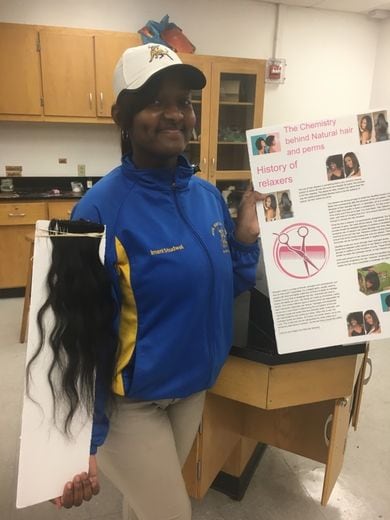
Katelyn Hunt (Miami-Dade ‘12) - Genius Hour
Honors Chemistry and AP Biology Teacher, Miami Northwestern Sr. High School
In her 6th year of teaching, Ms. Hunt wanted to do something different with her traditional chemistry class. She wanted to give her chemistry students a chance to ‘deep dive’ into something they were passionate about and leave her class feeling like they had explored and learned ‘something cool’ that they were invested in. Playing off of Google’s ‘Genius Hour’, a time given to employees to work on passion projects, Ms. Hunt brought ‘Genius Hour’ to her classroom. For three weeks, students were asked to create something, present it and explain the chemistry behind what they did. Students explored a wide variety of topics including the chemistry behind anesthesia, antidepressants, hair relaxers, lip gloss and bath bombs! From her project, Ms. Hunt concluded that when given resources and support, students will exceed expectations on researching a topic. She also learned that students lose curiosity as they go from elementary to high school and it takes work to restore.
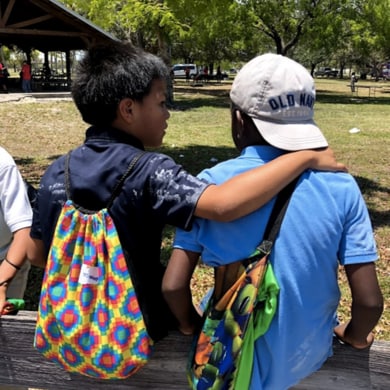
Alexandra Pierce (Miami-Dade ‘15) - Build Brownsville
3rd Grade Reading Teacher, Earlington Heights Elementary
While students have positive interactions and relationships with each other throughout the day at Earlington Heights Elementary School, Ms. Pierce noticed that her students seemed disconnected from each other when they left school due to neighborhood tensions and issues happening in the community. She explained that her students carry a level of fear that is palpable in all aspects of their daily interactions. For her project, Ms. Pierce wanted to ignite her 3rd grade students’ passions to contribute to their community and instill a sentiment of ownership and responsibility in making the neighborhood a more welcoming place. She wanted students to become more aware of and involved in the issues, in order to create a new sense of community within Brownsville and in the school. Students brainstormed as a class and discussed issues happening in their community and why they are happening. Then, each student learned how to research a community issue of their choice using reliable sources. Students chose issues like gun violence and drug usage. After researching, they wrote an essay informing someone they know about the issue and why it is important. Then lastly, they proposed actionable steps to help solve the issue at a local level. Through discussion and communication techniques, students will select the action step they think will most impact the community. Ms. Pierce has already noticed the impact the project is having on her 3rd graders: 100% of students are able to identify issues in their community and explain why these issues are important. In the future, she hopes to see and measure how many of these students go on to explore service-related careers.
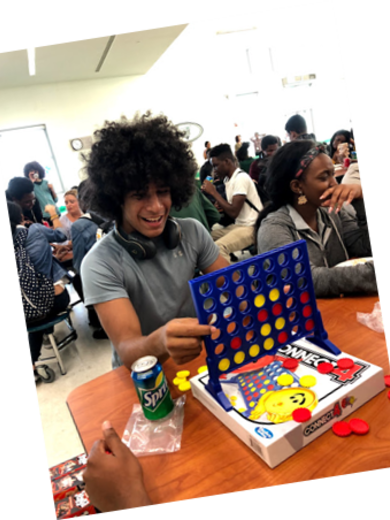
Jaclyn Schroder (Miami-Dade ‘12) and Lianne Shemitz (Miami-Dade ‘11) - PBIS Improving Student & Faculty Culture
(Ms. Schroder) English Instructor/Department Chair and (Ms. Shemitz) English Teacher, North Miami Sr. High School
For their project, Ms. Schroder and Ms. Shemitz wanted to address the lack of a Positive Behavior Incentive System (PBIS) at their school. Their goal was to improve school culture by recognizing and celebrating students for making positive choices. To ensure students felt seen, heard, and valued, they also let them have a voice in deciding the incentives. Students decided to implement incentives in two ways: weekly recognition with ‘Pioneer of the Week’ awards, and a quarterly celebration PBIS event with games, music and activities chosen by the students. Ms. Schroder and Ms. Shemitz promoted the initiative faculty-wide. As the project unfolds, they are already seeing incredible results. From the beginning of the project until now, student attendance at the PBIS events increased by 220% and teacher nominations for Pioneer of the Week by 119%. Next year, Ms. Schroder and Ms. Shemitz hope to engage more teachers in the system and work with their students to incorporate even more incentive feedback. “No one has ever done stuff like this for us,” says one student. It is clear that Ms. Schroder and Ms. Shemitz’s PBIS Initiative is strengthening school culture for both students and staff.
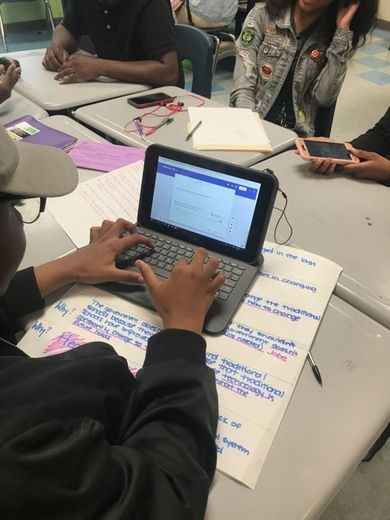
Eric Steen (Miami-Dade ‘15) - Project based learning: Entrepreneurship/Lean Startup
10th Grade English Teacher, Miami Central Sr. High School
For his project, Mr. Steen sought to address the problem that the public school classroom learning model has not changed in the past 100 years, leading to low student engagement. As an entrepreneur himself and founder of the My Student Blueprint app, Mr. Steen chose to address this problem by giving students an opportunity to engage in project-based learning activities that would teach entrepreneurial skills and lean startup principles. Over the course of three weeks, students were able to learn brainstorming, topic research, root cause and analysis and how to work together in a team setting. Then, they created group pitch decks and video presentations. Students chose to research a variety of topics, including educational inequity, obesity, sex education and understanding rights as citizens. One of the most outstanding and beneficial results from the project was that students now understand how to utilize services provided by Google such as Google Drive, Forms, Slides, and Docs, resources which will help them on their academic and professional journeys. Mr. Steen says, “I learned that students want to engage in learning activities and projects that enable them to use their own skills, acquire new skills and create something tangible.” Next year, Steen plans to refine his project and have an end of the year ‘Shark Tank’ competition for his classes.
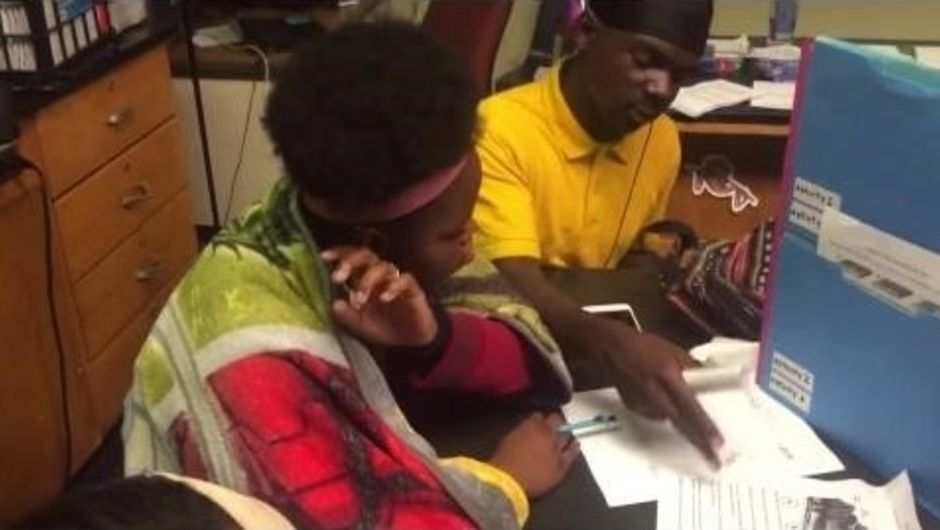
Jacqueline Zambrano (Miami-Dade ‘16) - Student Tutors Increasing Feedback in the Classroom
8th Grade Research (Science) Teacher, Madison Middle School
For Ms. Zambrano’s project, her goal was to develop a project to help her better serve her 128 8th grade science students. Her students had 14 classes to review seven “clusters” of topics on their 8th grade science exam, but with only one instructor, they were not getting enough one-to-one feedback. “Feedback is important, because it is among the most critical influences on student learning and helps to more easily address misunderstandings,” says Ms. Zambrano. For her project, she trained four of her highest performing students to become student tutors and work closely with their classmates. Each tutor signed a commitment to provide assistance to their peers in exchange for a certificate of community service hours. Using poll responses from student tutees, current class data compared with mid-year data and tutor testimonials, Ms. Zambrano concluded that the project was beneficial to both student tutors and tutees.
For the tutors, many of whom were introverts, the experience provided the opportunity to improve communication skills, increase responsibility, empathy and confidence in material. For the tutees, it helped to increase content mastery through increased feedback .One student tutor, Willy, said, “It felt good knowing that I could help a classmate if they didn’t know something. Being a tutor helped me strengthen my knowledge as well.
To our Innovative Educator Fellows, we extend a sincere congratulations for the work they have done to successfully implement their innovation projects. Stay tuned to our ‘Stories’ page and Social Media posts (@TFAMiamiDade) for more updates as these projects evolve. Interested in learning more about how TFA Miami-Dade is leading the way for developing innovative educators? Meet the Finalists for TFA’s Social Innovation Award, 20% of whom are TFA Miami-Dade alumni!


